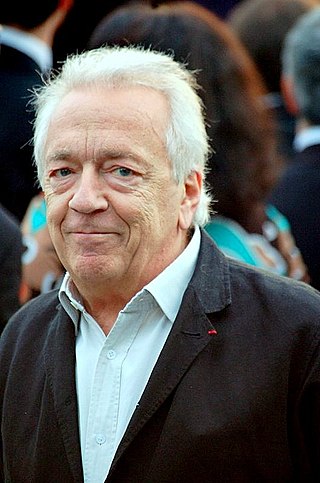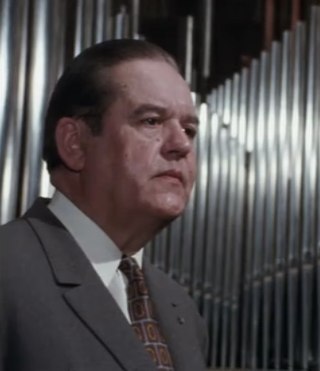Biography
Ulmer grew up in Spain, where he started work as a musical performer, writer, and composer for the movies. However, it was in France that he quickly found a permanent place in the musical firmament with his immortal cliché of Parisian tourism, Pigalle, which he co-wrote in 1944 with the lyricist, Géo Koger, and composed with Guy Luypaerts. Other than his own interpretation, the song was also covered by Jean Sablon, Charles Dumont, Franck Pourcel, Paul Anka, Bing Crosby, Petula Clark, Silvio Berlusconi, and many others.

Maurice Auguste Chevalier was a French singer, actor and entertainer. He is perhaps best known for his signature songs, including "Livin' In The Sunlight", "Valentine", "Louise", "Mimi", and "Thank Heaven for Little Girls" and for his films, including The Love Parade, The Big Pond, The Smiling Lieutenant, One Hour with You and Love Me Tonight. His trademark attire was a boater hat and tuxedo.

Édith Piaf was a French singer, lyricist and actress. Noted as France's national chanteuse, she was one of the country's most widely known international stars.

Pigalle is an area in Paris around the Place Pigalle, on the border between the 9th and the 18th arrondissements. It is named after the sculptor Jean-Baptiste Pigalle (1714–1785).

Gilbert Bécaud was a French singer, composer, pianist and actor, known as "Monsieur 100,000 Volts" for his energetic performances. His best-known hits are "Nathalie" and "Et maintenant", a 1961 release that became an English language hit as "What Now My Love". He remained a popular artist for nearly fifty years, identifiable in his dark blue suits, with a white shirt and "lucky tie"; blue with white polka dots. When asked to explain his gift he said, "A flower doesn't understand botany." His favourite venue was the Paris Olympia under the management of Bruno Coquatrix. He debuted there in 1954 and headlined in 1955, attracting 6,000 on his first night, three times the capacity. On 13 November 1997, Bécaud was present for the re-opening of the venue after its reconstruction.

André Caplet was a French composer and conductor of classical music. He was a friend of Claude Debussy and completed the orchestration of several of Debussy's compositions as well as arrangements of several of them for different instruments.

Georges Moustaki was an Egyptian-French singer-songwriter of Jewish Italo-Greek origin. He wrote about 300 songs for some of the most popular singers in France, including Édith Piaf, Dalida, Françoise Hardy, Yves Montand, Barbara, Brigitte Fontaine, Herbert Pagani, France Gall, Cindy Daniel, Juliette Gréco, Pia Colombo, and Tino Rossi, as well as for himself.

Jean-Pierre Cassel was a French actor.

Jean-Jacques Charles Grunenwald, also known by his pseudonym Jean Dalve, was a French organist, composer, architect, and pedagogue.

Pierre-Eugène Veber was a French playwright and writer.

René-Emmanuel Baton, known as Rhené-Baton, was a French conductor and composer. Though born in Courseulles-sur-Mer, Normandy, his family originated in Vitré in neighbouring Brittany. He returned to the region at the age of 19, and many of his compositions express his love of the area. He also had close relationships with composers of the Breton cultural renaissance, notably Guy Ropartz, Paul Le Flem, Paul Ladmirault and Louis Aubert. As a conductor he was notable for his attempts to expand appreciation of classical music.

Jacques Datin was a French composer.
Henri Bourtayre was a French composer.
Henri Betti, born Ange Betti, was a French composer and a pianist.
Maurice Yvain was a French composer noted for his operettas of the 1920s and 1930s. Some of which were written for Mistinguett, at one time the best-paid female entertainer in the world. In the 1930s and 1940s, he became a major success in the United States and several of his pieces appeared in the famous Ziegfeld Follies on Broadway. He also composed music for several films of notable directors such as Anatole Litvak, Julien Duvivier, and Henri-Georges Clouzot. Yvain's music blended with the then "spirit of Paris".
André Hornez was a French lyricist and screenwriter.

André Mouëzy-Éon was a French dramatist, author of comedies, librettist, screenwriter and dialoguist.
"What Can I Do?" is a French popular song composed in 1947 by Henri Betti with the lyrics by Édith Piaf. The English lyrics were written in 1949 by Harold Rome.
Denise Benoît was a French actress and singer, active across a wide range of genres on the stage, radio and television. Other members of her family were musicians.

Trois Chansons, M 69, is a composition by Maurice Ravel for a cappella choir, set to his own texts. Ravel began the composition in December 1914 in response to the outbreak of World War I, in which he hoped to be enlisted to fight for France. While he waited for months, he wrote text and music of the three songs in the tradition of 16th-century French chansons. He completed the work in 1915, and it was published by Éditions Durand in 1916. The songs were premiered in 1917, performed by a choral ensemble conducted by Louis Aubert. They remained his only composition for a cappella choir.













